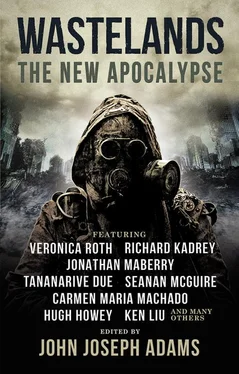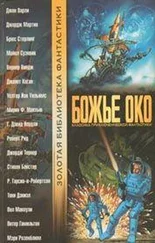They don’t like bright light, and it’s bright today, so bright that it’s giving me the nagging edge of a headache. That’s a good thing. Means until they hit the final stages, the middle of the day is as close to safe as it gets. We slept during the day for the first couple of months, like we had to shift our own internal clocks to match the monsters if we wanted to stay alive. I got over that pretty quick. If I’m going to die, I’d almost rather do it fast, with all the lights off, and never see it coming. They don’t like water, either. When it rains—and it’s been raining more and more as we move toward the wispy edge of winter—the streets are empty, and I can run down the sidewalk and see them watching sullenly from their hidey-holes, nothing but eyes in the dark, angry and yearning to lash out. They hate us. How they hate us, for the crime of being alive and uninfected.
They’d change both those things in a second if we let them. If we get careless. There was this song I heard once. A funny song, on one of my little brother’s nerd radio shows. It was about the old Looney Tunes characters, about that coyote who always wanted to catch the roadrunner. He talked about all the times he’d lost, all the times he’d failed, and then he said—sang, I guess—“Remember that I have to win only once.”
I remember.
I remember a lot of things I don’t want to remember.
I remember my little brother—Danny, Danny, it’s so hard to even think his name anymore, after everything that happened, after everything fell apart—sitting at the dinner table, talking too fast around a mouthful of mashed potatoes, trying to make us care about some stupid article he saw online. Bats in Arizona, he’d said. Rabid bats, and rabid coyotes, and rabid dogs turning on their owners.
“Whatever, Cujo,” I said, and rolled my eyes, and Dad laughed, and I felt this hot pride in my chest, because I’d made our father happy and Danny hadn’t, and sometimes that was what mattered. We weren’t brother and sister—we were combatants in the same gladiatorial ring, both fighting for the prize of parental approval.
That night, I won and Danny lost, and I’d give anything to take it back, anything at all. Even my life. If I could just rewind the clock long enough to relive that one evening, to savor my food and smile at my brother and be his friend and his supporter, not his adversary, I’d take the consequences willingly.
But I can’t. The world is broken, the world is wrong , and still we don’t have time travel, or magic, or any of the other things the books used to say would come and save us. We just have the sunlight, and the rain, and the slow decay of everything that matters.
We just have the end.
* * *
I’m hungry.
It was easier before the power grid went down. Back then, I could flip a switch and play God, let there be light, let there be safe passage through the aisles of canned vegetables and shelf-stable legumes. I ate so many beans during the first few weeks that I was terrified I’d fart so loudly it would lead them right to me. Death by flatulence. Not a great thing to put on my headstone—not that I was ever going to get one. Graveyards are a thing of the past, of course. They’re smart , the ones who used to be us, and they like to leave corpses in the places we’re likely to go, propping them up against walls and stretching them across doorways.
Corpses carry all kinds of disease. Not just the big one. Lots of nasty things enjoy making a meal of human flesh, and if you breathe in too deeply around the dead, you’re likely to join the legions of the lost in no time at all.
So first the stores filled up with dead bodies, and then the lights went out, and now every Target is a potential killing field, every Safeway is an abattoir, because there’s no flashlight bright enough to keep them away forever.
I’m so hungry. I’m hungry, and I’m thirsty, and my head is killing me.
Someone has already done the hard work of smashing the store windows; glass glitters in the sun, tipped here and there with streaks of blood. I don’t know if it’s ours or theirs , which means I have to treat it all as an infection risk. The light stretches into the store, bright and buttery and inviting.
I can’t see any food there, but that doesn’t have to mean anything; maybe the shelves at the front have been picked bare, or maybe they pulled the food back, out of the light, to save it for themselves. They don’t usually spend their days sleeping on linoleum, and why should they? They still have houses. They still have beds, and shelter, and walls to keep out the weather, the sun and rain. We accidentally created the perfect dens for our own destruction, and now those of us who are still us scavenge around the edges, trying not to be seen.
It’s probably safe. It’s probably safe. There’s almost no chance someone is hiding in there, waiting to strike. Unless it’s a hungry dog. They don’t have homes anymore, and they’re all infected, and they hide wherever the sun doesn’t reach, at least until the final stages, when the anger and confusion and disorientation is finally enough to drive them out into the light.
I pull a rock out of my pocket, weighing it carefully in my hand before I fling it through the opening. It clatters on broken glass, rolling across the linoleum with soft thumping sounds until it comes to a rest against the base of a shelf. There are no other sounds. I start to step forward, and stop as a hand grabs my elbow.
Any contact is enough to make me freeze. I count to ten and there’s no pain, no teeth in my shoulder or knife in my side. Slowly, I turn.
The girl behind me must have been pretty, twenty pounds and a bunch of showers ago. Now she’s gaunt and filthy, like everyone else. They don’t like water, but they got to keep all the showers, all the warm, comfortable bathrooms and soft, clean towels.
Nothing about this is fair.
“Wait,” she mouths, and she isn’t hurting me, so I wait, because everyone who isn’t attacking is an ally now: that’s the way you stay alive.
I wait, and all is silence, and I’m about to shake her off and follow my stone into the store when I hear it. It’s a small sound. I might not have noticed it if I hadn’t been standing in silence for so long.
The clap of a palm against a shelf, soft and moist and undeniably human, too high up to belong to a dog, too quick to belong to an unthinking creature.
Something in me deflates. The store isn’t safe. “Thanks,” I mumble, and I both mean it—I’m still alive, still uninfected, still me —and I don’t, because part of me is waiting for the day when I slip. Remember that they have to win only once.
I can’t give up. I can’t surrender. For Danny. For the way he used to laugh in triumph when he unsnarled a particularly tough problem, for the way he was teaching himself how to code, for all the things he was never going to have the chance to do—for the way he tried to warn me, before everything went wrong, when we thought we’d have our entire lives to learn how to safely love each other, allies and adversaries and gladiators in the same ring, competing for the safe harbor of our father’s affection. Because he didn’t have this chance, I have to keep fighting, and fighting, and fighting, until something takes the fight away.
But I’m so tired. I’m so tired, and I’m so lonely, and sometimes I just want it to be over.
“Don’t worry about it,” says the unfamiliar girl. She looks me over, measuring, assessing. We’re going feral, one day at a time, locked out of the civilized world our ancestors spent their lives creating. “You from this neighborhood?”
Читать дальше


![Nick Cracknell - The Quiet Apocalypse [= Island Zero]](/books/28041/nick-cracknell-the-quiet-apocalypse-island-zero-thumb.webp)









